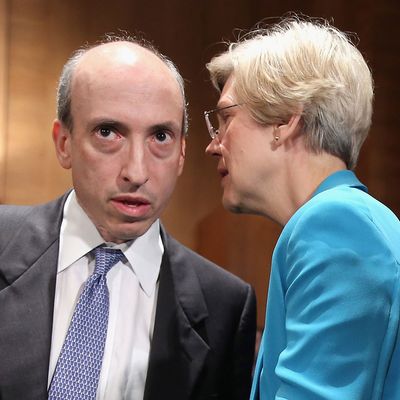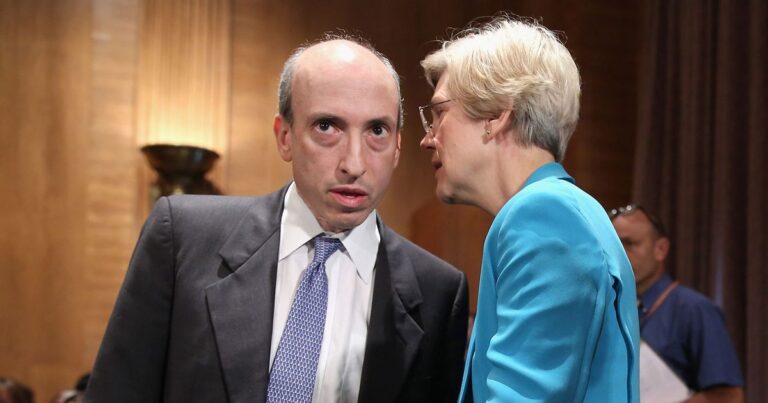
Neither Gary Gensler nor Elizabeth Warren are fans of cryptocurrency.
Photo: Chip Somodevilla/Getty Images
One warm evening in late September 2023, billionaire hedge fund investor turned crypto investor Mike Novogratz walked into a restaurant in Washington, DC. The Galaxy Digital CEO from New York was spending the day touring Congress on Capitol Hill as part of a group of crypto entrepreneurs (most of them young people of color) organized by industry giant Coinbase to send a message to Democrats at a time when crypto is increasingly seen as a Republican voice. Some key lawmakers didn't even attend the meeting. “I'm a Democrat, and it's very frustrating that they don't see crypto as progressive,” Novogratz, an avowed progressive who has donated millions to the party, including to Joe Biden in 2020, told me.
One Democrat has grown more frustrated than most: Securities and Exchange Commission Chairman Gary Gensler. Gensler has spent much of his time in the Biden administration attacking cryptocurrencies, dismissing the need for new industry regulation, widely suing and threatening crypto-related companies, and blocking new products like crypto exchange-traded funds. And it seems many in his party are taking their cues from Gensler.
“Gensler is becoming a real problem for our industry,” Mr. Novogratz lamented of his former Goldman Sachs colleague. “I want to grab him by the throat and punch him, and I probably would, but I don't want to get his blood on my nice suit,” he said, gesturing to his cream-colored outfit.
Now, nine months later, many Democrats have enacted Novogratz’s ideas into law, delivering a meaningful (albeit partial and far from unanimous) rebuke to Gensler and a faction of their party led by Senator Elizabeth Warren, who has been staunchly anti-crypto. In May, the Senate, in a 60-38 vote that included 11 Democrats and independent Senator Kyrsten Sinema, repealed the SEC’s accounting rules for digital assets, despite President Biden’s veto threat. (The bill would have allowed financial institutions to treat cryptocurrency holdings on behalf of clients the same as traditional assets, without putting them on their balance sheets.) Senator Chuck Schumer voted in favor, an unusual move for a Democrat and Senate Majority Leader, effectively going against the will of his party’s leadership. Senators Cory Booker, Kirsten Gillibrand, and Ron Wyden also voted in favor. A week later, 71 Democrats, including former Speaker Nancy Pelosi, overcame the objections of Gensler's SEC and the White House to pass the Financial Innovation and Technology Act of the 21st Century (FIT21) in the House of Representatives. This was historic in that it was the first time that a bill aimed at regulating cryptocurrencies was passed. Both bills were actively supported by crypto industry lobbying groups. Late on the last Friday night in May, Biden vetoed the Senate bill, but the simultaneous actions of both houses of Congress on the two separate bills undoubtedly marked the moment when the Democratic Party was no longer a purely anti-cryptocurrency party.
“In terms of public policy, Gary Gensler is dead wrong on this,” North Carolina Democrat Wiley Nickel, a co-sponsor of the House bill, told me. Nickel hopes the vote (regardless of the bill's fate in the Senate) will signal that many Democrats don't share Gensler's or Warren's views. “If Biden gives Gary Gensler the sole say on this, he's sure to lose a significant number of votes,” Nickel added. “If the Democrats are the party of Web 3, blockchain and cryptocurrency, they're just going to lose votes.”
Then on May 23, another surprising development complicated things further: The SEC had initially suggested it would block a series of new financial products (known as ETFs, or exchange-traded funds) that would have made it easier for ordinary investors to buy ethereum, the second-largest cryptocurrency, but then suddenly, and to the shock of many observers, reversed course and approved eight of the products, including that of Novogratz's company. “It gives the impression that the SEC's stance changed literally overnight,” Emily Choi, president and COO of Coinbase, said in a conference call just before the approval. “Maybe the administration sensed panic.”
These developments came weeks before there were signs that Democrats were beginning to actually panic about the political ramifications of being perceived as crypto-hostile. Perhaps not coincidentally, this came after Donald Trump announced that his campaign was accepting crypto donations and that he was “building a crypto army to help win my campaign on November 5th.” At a campaign event for Trump NFT holders at Mar-a-Lago in May, the former president called influential crypto entrepreneur Ryan Selkis, who had previously voted for Biden, to the stage, where Selkis voiced his support for Trump.
“Suddenly the attitude of Democrats in crypto, their conversational tone in Congress, and their friends in the White House has changed. It went from, 'Hey guys, this is something you really should pay attention to,' to, 'Oh my god, we're going to lose,'” said a person close to the industry. “We've been listening to Gary Gensler and Elizabeth Warren for so long, and now we're being pushed into a corner.” Warren, of course, has long been crypto's biggest foe, making her belief that the industry is largely a scam a core part of her platform. In a campaign ad last year, she featured a Politico headline: “Elizabeth Warren Is Building an Anti-Crypto Army.”
For months now, pressure has been building on Democrats to reach out to crypto advocates in a conciliatory manner. Coinbase-backed pro-crypto super PAC FairShake has raised nearly $100 million in this election and helped defeat Katie Porter in the California Senate primary in March, running ads attacking her for being a Warren ally. Recent polls suggest that 20% of registered voters own cryptocurrencies, amounting to about 35 million Americans, many of them young black men, a cohort important for Democrats. “This is a pretty large group, and a lot of them are voters who are only interested in certain issues,” Nickel says. “And they were organized, and there was real money, material money, being put into it,” says the veteran Democratic strategist.
“This is one of those issues that nobody is against. You're not going to get any new votes by being against crypto,” the strategist said. “There are only good political and policy things to be for and bad political and policy things to be against.”
The environment surrounding cryptocurrencies has also changed recently. In Washington, many believed (or hoped) that cryptocurrencies would simply die and fade away after the collapse of FTX and the imprisonment of Sam Bankman-Fried, but the opposite has proven true. Bitcoin has recently traded at an all-time high, making crypto more accessible to ordinary Americans thanks to a new Bitcoin ETF approved in January by Gensler's SEC. But the SEC and Congress have yet to chart a regulatory path for the industry to operate legally and have enacted few practical protections for consumers. There has been growing frustration among Democrats that they have bungled the issue in a way that could cost them a significant number of votes in 2024. “The approach that both Gary Gensler and Elizabeth Warren have advocated for – refusing to regulate technology because that's the best way to kill it – no longer makes sense. It's a failed policy,” says one person who has worked in previous Democratic administrations. “Our polling shows that millions of voters will vote against Joe Biden because of Gary Gensler's approach on this issue. With our democracy on the line, this is a stunningly irresponsible approach.”
While Democrats were reluctant to acknowledge that Trump's about-face from a first term that wasn't particularly crypto-friendly contributed to more lawmakers than expected voting for the crypto industry-backed bill, lobbyists and crypto advocates in Washington said it appeared to be a game changer. “The shift is the result of lengthy negotiating efforts between the industry and Democrats. The landslide victory is the result of one person: President Trump,” Selkis told me. “The president broke Elizabeth Warren's spell on Democrats in the Senate, the House and the White House.”
Whether the White House will adopt a friendlier stance toward cryptocurrencies before the election remains a mystery. But there are signs that change is afoot. Notably, Biden did not threaten to veto the House bill as he did with the Senate bill, saying that despite his opposition, he “want to work with Congress to ensure a comprehensive and balanced regulatory framework for digital assets.” (Justin Slaughter, policy director at crypto venture capital firm Paradigm, one of the most active industry players in Washington, called this “the most forward-thinking statement on cryptocurrencies to date from the White House.”)
Biden's veto of the Senate bill late Friday came after a series of efforts by Democrats in Congress to persuade Biden to back down, including devising alternatives that would give Biden an escape route without breaking his promise. Nickel told me he hopes Gensler will roll back the rule altogether. There is considerable skepticism within the party about whether Biden's actions were the right move. Given its anti-cryptocurrency tenor, the veto amounts to “political malfeasance,” the Democratic strategist said, using language he's heard from other Democrats about the White House's crypto efforts. “I think the White House is going to make a decision sooner or later that they don't want Gary Gensler to potentially impact their ability to win the election. And he did. He really did. Millions of crypto voters are going to vote for or against this.”
But even for pro-crypto Democrats, it's a big leap to flip to Trump on this one issue. “There's a lot of soul-searching going on in the industry, and for a lot of people who grew up voting Democratic, it's very complicated to think about to some degree. Why would this man I voted for, and this party I voted for, try to put my industry out of business?“I've seen my colleagues working on this,” said a person close to the cryptocurrency industry.


